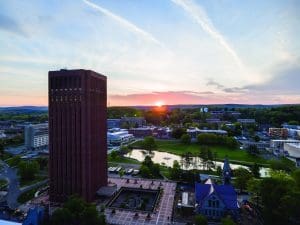
Colleges and universities have always been a wellspring for innovation and the University of Massachusetts Amherst has been a stand-out among them. As social and economic concern has grown over how we manufacture, consume, and discard products, UMass Amherst has brought its intellectual and educational firepower to bear on issues such as recycling, composting, and sustainability.
It all began in 2007 when the president of the five-campus UMass system signed the American College and University Presidents’ Climate Commitment. In response, UMass Amherst established an Environmental Performance Advisory Committee (EPAC) that developed the campus’ first Climate Action Plan, which was released in 2010. Two years later, the plan was revised by the Chancellor’s Sustainability Committee, formerly EPAC. The revised plan reflected campus accomplishments and presented a comprehensive blueprint for future sustainability efforts across all aspects of the campus. Climate Action Plan 2.0 helped establish metrics and sustainable goals for the campus.
Subsequently, undergraduates and graduate students campaigned to encourage a more environmentally friendly and ecologically sound approach to campus operations, including the hiring of Ezra Small as the school’s first Campus Sustainability Manager in Facilities & Campus Services. Today are more than a dozen employees focused on sustainability and working in a variety of positions, including, their communications, residential life, the library, and physical plant operations.
Recycling and composting: turning trash into treasure
In 2013, UMass started the Sustainability Innovation & Engagement Fund. Fifty thousand dollars were given as a competitive small grant open to students, faculty, and staff. Over a dozen projects were funded, including the New 2 U Waste Program with the support of the Post Land Action Network which was started as a similar pilot program two years prior at the University of New Hampshire.
As a major public university, UMass Amherst has one of the largest residential programs in the country, with over 13,500 students living on campus. Every spring, as part of New 2 U, students collect all the cleaning products, kitchen utensils, clothing, and furniture left behind by departing resident students. Items are stored in trailers and buildings over the summer then, come fall, a one-day tag sale is held for incoming students to furnish their dormitories with the reclaimed items. In 2016, $11,000 were netted from the sale and earmarked to go back into the sustainability program — revenue generated from almost 20 tons of clothing collected and 10 tons of cast-off products that were redirected from going to a landfill.
And that’s not all. As part of its recycling and composting initiatives, UMass is promoting student-led, centralized outdoor composting. The university is now composting over 1,500 tons of biodegradable waste annually on campus. As the largest waste stream on campus, this consists of approximately 500 tons of non-food compostable to-go items such as packaging “clamshells”, cups, napkins, and other paper products coming out of UMass’s retail dining facilities. The other 1,000 tons consists of pre-consumer kitchen food scraps and post-consumer food waste.
What makes this kind of sustainability program so exciting is not just the immediate environmental benefit but the larger, long-term effort to fundamentally change how products are manufactured and consumed in this country and across the globe. UMass is helping lead the charge in a growing effort to create a highly-sustainable, circular economy one that evolves from the current “take, make, and dispose” model to a restorative and regenerative one that minimizes energy consumption and maximizes recycled production feedstocks.
Reaching for the STARS
As a result of its campus-wide, integrated energy-efficiency and recycling achievements, UMass has earned the distinction of becoming one of only 121 campuses nationwide to earn a Gold rating from the Sustainability Tracking, Assessment & Rating SystemTM (STARS), a transparent, self-reporting framework for colleges and universities to measure their sustainability performance.
STARS is intended to engage the full spectrum of secondary educational institutions, from community colleges to research universities — establishing more-modest goals for institutions that are taking first steps toward sustainability while setting more demanding, long-term sustainability goals for already high-achieving institutions.
There is no question that sustainability is key for creating a brighter, healthier future. As an educational incubator for tomorrow’s innovators, UMass is committed to growing its sustainability efforts and fostering innovation across a broader landscape of opportunity. Perhaps Campus Sustainability Manager Ezra Small said it best, “UMass Amherst’s goal is to be the university where sustainability principles can be incorporated into fields such as landscape, regional planning, and the built environment, but also the destination of choice for top students wanting to enter the field of sustainability.”
UrthPact commends the sustainability efforts of UMass Amherst. We help support companies and organizations looking to make their plastic parts more sustainable. Whether compostable or recycled plastic, we can help you create more sustainable injection molded plastic products. Please contact us today.



